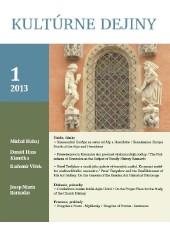Renesančná Európa na sever od Álp a Herodotos
Renaissance Europe North of the Alps and Herodotus
Author(s): Michal HabajSubject(s): History
Published by: VERBUM - vydavateľstvo Katolíckej univerzity v Ružomberku
Keywords: Herodotus; reception; renaissance; scholarship; Greek studies
Summary/Abstract: The study showed that there had been a wide interest for Herodotus‘ work outside the Italy during Renaissance. He was reciped not only by historiographers but also by representants of other branches of contemporary science. He had been included in the discourse of ethnography, geography as well as medicine or the theory of literature. In the context of Herodotus‘ reception, the study dealt with two important questions. First, with the attitudes towards Herodotus‘ veracity in the renaissance culture. As had been showed on the examples from some countries, his veracity had been firstly doubted, especially in the generation of Erasmus, because of its dependence on classical tradition. But the next generations of David Chytraeus or Henri Estienne accepted Herodotus as faithful source for Greek history. The explanation for this change can be seen in the educational process, because the new generation gained its original attitude towards Greek antiquity thanks to the studium of Greek language. The next important question related to the position of Herodotus as pagan historian in the culture profusely based on the Christianity. We showed that his reception in this respect depended on the general attitude towards Greek. The acceptance of Greek had been the key to the successful reception of Herodotus. Melanchton and later Chytraeus used Herodotus for the completation of Bible. For these humanist Herodotus did not stand in contrast with Bible at all. On the contrary, they accepted his history as the continuation of Bible. One more interesting result of our research relates to the attitude of Arnaldo Momigliano towards the question about Herodotus‘ veracity. According to Momigliano the main turning point in accepting Herodotus as a truthful author in the Renaissance is related to the overseas discoveries. Europeans met that time unusual habits and customs. What had been only with difficulty accepted before this event, became more believable. The discoveries showed to Europeans diversity, having made Herodotus‘ speech by the way more plausible. This argument of Momigliano was subsequently accepted by other researchers. But we can only partly agree with it. Undoubtedly there has been a strong influence of new discoveries but this influence had surely not been the most important argument for changing a position toward Herodotus. We have couple of reasons for this claim. The Europeans had been in contact with different cultures already before overseas discoveries. No one of influentials humanists used this argument in the apology of Herodotus. Some humanists even ignored or did not know about these discoveries. Therefore we find this argument as repriced and we see the above mentioned reasons as more important in the whole change.
Journal: Kultúrne dejiny
- Issue Year: 2013
- Issue No: 1
- Page Range: 6-19
- Page Count: 14
- Language: Slovak

